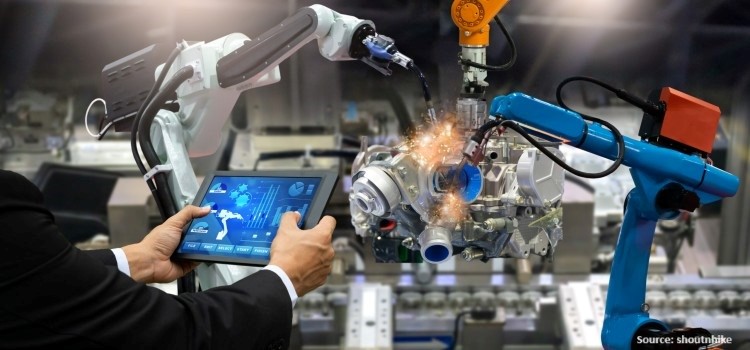Semiconductor Manufacturing Equipment Market by Equipment type (Front-end Equipment and Back-end Equipment), by Application (Logic and Memory, Analog and Mixed-Signal, Discrete Devices, Optoelectronics, and Others), by Dimension (2D ICs, 2.5D ICs, and 3D ICs), by Size of Manufacturing Facility (Large-scale Manufacturing Facilities, Medium-scale Manufacturing Facilities, and Small-scale Manufacturing Facilities), by Supply Chain Process (IDM Firms, OSAT Companies, and Foundries) and by End-User Industry (Consumer Electronics, Automotive, Industrial, Healthcare, Aerospace and Defense, and Other End-Users) – Global Opportunity Analysis and Industry Forecast, 2024– 2030
Semiconductor Manufacturing Equipment Market Overview
The Semiconductor Manufacturing Equipment Market size was valued at USD 102.74 billion in 2023 and is predicted to reach USD 180.45 billion by 2030 with a CAGR of 8.4% from 2024-2030. The semiconductor manufacturing equipment market also known as semiconductor fabrication materials market refers to the industry involved in developing machinery, tools, and systems used in fabricating semiconductor devices.
This equipment is essential for various stages of semiconductor manufacturing processes, including wafer processing, assembly, packaging, testing, and inspection. The market serves semiconductor manufacturers worldwide, providing them with the tools and technologies necessary to produce integrated circuits and other semiconductor components used in electronic devices such as computers, smartphones, automotive systems, etc.
Market Dynamics and Trends
The semiconductor manufacturing equipment market growth is strongly influenced by widespread government initiatives aimed at fostering the expansion of the semiconductor industry. Governments play a crucial role in advancing this sector by allocating funds for research and development, offering incentives to promote technological innovation, investing in skills development and education, and prioritizing global competitiveness and sustainability.
As evidenced by data from the Semiconductor Industry Association (SIA), global semiconductor sales rose to USD 574 billion in 2022, up from USD 555.9 billion in 2021, underscoring the positive impact of government support on the market worldwide.Additionally, the worldwide increasing automotive production is another factor driving the market by boosting the demand for advanced semiconductor components essential for modern automotive technologies.
According to the Association of European Automobile Manufacturers (ACEA), the global production of motor vehicles reached 85.4 million units in 2022, reflecting a 5.7% increase from 2021. Modern vehicles require a wide array of semiconductor components for functionalities such as infotainment systems, safety features, power management, and connectivity. As automotive manufacturers ramp up production to meet the growing consumer demand for technologically sophisticated vehicles, the demand for semiconductor manufacturing equipment rises.
Moreover, the semiconductor industry further drives the semiconductor fabrication materials market growth by increasing the demand for advanced equipment to boost production capacity and enhance efficiency. As per the Semiconductor Industry Association (SIA), the global semiconductor industry sales reached USD 149.9 billion in the second quarter of 2024, marking an 18.3% increase compared to the same period in 2023. This surge in production is fueling the demand for sophisticated manufacturing equipment, significantly contributing to the growth of the market worldwide.
However, the high initial capital investment required for acquiring and maintaining advanced equipment restrains the growth of the market. The huge capital requirement poses a significant barrier to entry for smaller semiconductor manufacturers and startups, limiting market competitiveness and innovation.
On the contrary, the integration of artificial intelligence (AI) in semiconductor manufacturing is expected to create future opportunities in the semiconductor manufacturing equipment market expansion by enhancing chip design efficiency and quality. AI is expected to optimize technical parameters, detect and correct defects, and automate processes such as quality inspection and production planning.
Market Segmentations and Scope of the Study
The semiconductor manufacturing equipment market report is segmented on the basis of equipment type, application, dimension, size of manufacturing facility, supply chain process, end-user industry, and region. On the basis of equipment type, the market is segmented into front-end equipment and back-end equipment. The front-end equipment segment is further divided into lithography equipment, wafer surface conditioning, wafer cleaning, deposition, and other front-end equipment. The back-end equipment segment is further categorized into assembly and packaging, dicing, metrology, bonding, and wafer testing/ IC testing. On the basis of application, the market is classified into logic and memory, analog and mixed-signal, discrete devices, optoelectronics, and others. On the basis of dimensions, the market is divided 2D ICs, 2.5D ICs, and 3D ICs. On the basis of size of manufacturing facility, the market is distributed into large-scale manufacturing facilities, medium-scale manufacturing facilities, and small-scale manufacturing facilities. On the basis of supply chain process, the market is categorized into IDM firms, OSAT companies, and foundries. On the basis of end-user industry, the market is segmented into consumer electronics, automotive, industrial, healthcare, aerospace and defense, and other end-users. The regional breakdown includes regions such as North America, Europe, Asia-Pacific, and the Rest of the World (RoW).
Geographical Analysis
Asia-Pacific dominates the semiconductor manufacturing equipment market share and is expected to continue its dominance during the forecast period. This is attributed to the increasing government initiatives aimed at expanding the semiconductor market. These initiatives boost investment in new technologies and infrastructure. For example, in August 2023, Taiwan's Ministry of Economic Affairs (MOEA) outlined three areas of partnerships to enhance the semiconductor sector.
These areas include joining Taiwan’s core cluster, exploring new markets for semiconductor equipment and materials, and establishing research centers to tap into the rapidly growing Asian market. These efforts create a rising demand for advanced manufacturing equipment to support the expanding semiconductor production, thus fueling market growth in the region.
Moreover, the growing semiconductor manufacturing sector in this region further drives the market by increasing demand for advanced machinery and technology needed to produce more complex and high-performance chips. As semiconductor production increases, there is a heightened requirement for sophisticated equipment that handles intricate manufacturing processes, improve yield, and enhance efficiency. According to the Indian Ministry of Commerce and Industry (MOCI), the Indian semiconductor market was valued at USD 26.3 billion and is projected to expand to USD 271.9 billion by 2032. This surge in manufacturing activity fuels the market for cutting-edge equipment and solutions tailored to the evolving demands of the semiconductor industry.
On the other hand, North America region is steadily growing in terms of semiconductor manufacturing equipment market fueled by the increasing investments by companies including Evonik in the expansion of the region's semiconductor industry. These investments enable the acquisition of sophisticated tools and machinery that enhance production efficiency and meet the rising demand for semiconductors.
For instance, in June 2024, Evonik started production of ultra-high purity colloidal silica for the semiconductor industry at its new facility in Weston, Michigan. Additionally, the company opened the Global Semiconductor Center of Excellence in Allentown, Pennsylvania, as an investment in the semiconductor chemicals market. These developments contribute to the growing demand for sophisticated manufacturing equipment, thereby driving market growth in North America.
Also, the growth of market in North America is being driven by the expansion of semiconductor manufacturing plants in countries such as the U.S. and Mexico. As these plants expand their production capacity and upgrade their technology to meet the growing market demands, there is a corresponding increase in the demand for semiconductor manufacturing equipment.
For instance, in August 2023, the U.S. electronic component manufacturer Vishay Inter-technology opened a new semiconductor plant in Gomez Palacio, Durango, with a USD 45 million investment. The 18,000 square-meter site is projected to manufacture billions of semiconductors chips each year, mostly for use in the automotive industry.
Competitive Landscape
Various key market players operating in the semiconductor manufacturing equipment industry include Tokyo Electron Limited, Lam Research Corporation, ASML Holding, Applied Materials, Inc., KLA Corporation, SCREEN Holdings Co., Ltd., Teradyne, Inc., Advantest Corporation, Hitachi, Ltd., Plasma-Therm LLC., and others.
These market players continue to adopt various market development strategies including product launches to maintain their dominance in the market. For instance, in March 2023, SCREEN PE Solutions Co., Ltd. (a subsidiary of SCREEN Holdings Co., Ltd.) launched a new model of its Ledia series, the Ledia 7F-L direct imaging system to support high-precision pattern formation on large-size substrates and metal masks.
The new model is designed to meet the growing demand for high-precision pattern formation, particularly in telecommunications and IoT infrastructure applications. Additionally, in February 2023, Applied Materials launched the VeritySEM 10, a new eBeam metrology system designed to support high-NA EUV lithography.
This system offers industry-leading resolution and imaging speed, enabling chipmakers to accelerate process development and maximize yield in high-volume manufacturing. The VeritySEM 10 is a significant addition to Applied Materials' portfolio of eBeam inspection and metrology solutions, catering to the evolving needs of the semiconductor industry.
Key Benefits
-
The report provides quantitative analysis and estimations of the semiconductor manufacturing equipment market from 2024 to 2030, which assists in identifying the prevailing industry opportunities.
-
The study comprises a deep-dive analysis of the current and future semiconductor manufacturing equipment market trends to depict prevalent investment pockets in the industry.
-
Information related to key drivers, restraints, and opportunities and their impact on the semiconductor manufacturing equipment market is provided in the report.
-
Competitive analysis of the key players, along with their market share is provided in the report.
-
SWOT analysis and Porter's Five Forces model is elaborated on the study.
-
Value chain analysis in the market study provides a clear picture of the roles of stakeholders
Semiconductor Manufacturing Equipment Market Key Segments
By Equipment type
-
Front-end Equipment
-
Lithography Equipment
-
Wafer Surface Conditioning
-
Wafer Cleaning
-
Deposition
-
Other Front-End Equipment
-
-
Back-End Equipment
-
Assembly and Packaging
-
Dicing
-
Metrology
-
Bonding
-
Wafer Testing/ IC Testing
-
By Application
-
Logic and Memory
-
Analog and Mixed-Signal
-
Discrete Devices
-
Optoelectronics
-
Others
By Dimension
-
2D ICs
-
2.5D ICs
-
3D ICs
By Size of Manufacturing Facility
-
Large-scale Manufacturing Facilities
-
Medium-scale Manufacturing Facilities
-
Small-scale Manufacturing Facilities
By Supply Chain Process
-
IDM Firms
-
OSAT Companies
-
Foundries
By End-User Industry
-
Consumer Electronics
-
Automotive
-
Industrial
-
Healthcare
-
Aerospace and Defense
-
Other End-Users
By Region
-
North America
-
The U.S.
-
Canada
-
Mexico
-
-
Europe
-
The UK
-
Germany
-
France
-
Italy
-
Spain
-
Denmark
-
Netherlands
-
Finland
-
Sweden
-
Norway
-
Russia
-
Rest of Europe
-
-
Asia-Pacific
-
China
-
Japan
-
India
-
South Korea
-
Australia
-
Indonesia
-
Singapore
-
Taiwan
-
Thailand
-
Rest of Asia-Pacific
-
-
RoW
-
Latin America
-
Middle East
-
Africa
-
REPORT SCOPE AND SEGMENTATION:
|
Parameters |
Details |
|
Market Size in 2023 |
USD 102.74 Billion |
|
Revenue Forecast in 2030 |
USD 180.45 Billion |
|
Growth Rate |
CAGR of 8.4% from 2024 to 2030 |
|
Analysis Period |
2023–2030 |
|
Base Year Considered |
2023 |
|
Forecast Period |
2024–2030 |
|
Market Size Estimation |
Billion (USD) |
|
Growth Factors |
|
|
Countries Covered |
28 |
|
Companies Profiled |
10 |
|
Market Share |
Available for 10 companies |
|
Customization Scope |
Free customization (equivalent up to 80 working hours of analysts) after purchase. Addition or alteration to country, regional, and segment scope. |
|
Pricing and Purchase Options |
Avail customized purchase options to meet your exact research needs. |
Key Players
-
Tokyo Electron Limited
-
Lam Research Corporation
-
ASML Holding
-
Applied Materials, Inc.
-
KLA Corporation
-
SCREEN Holdings Co., Ltd.
-
Teradyne, Inc.
-
Advantest Corporation
-
Hitachi, Ltd.
-
Plasma-Therm LLC




 Speak to Our Analyst
Speak to Our Analyst






























